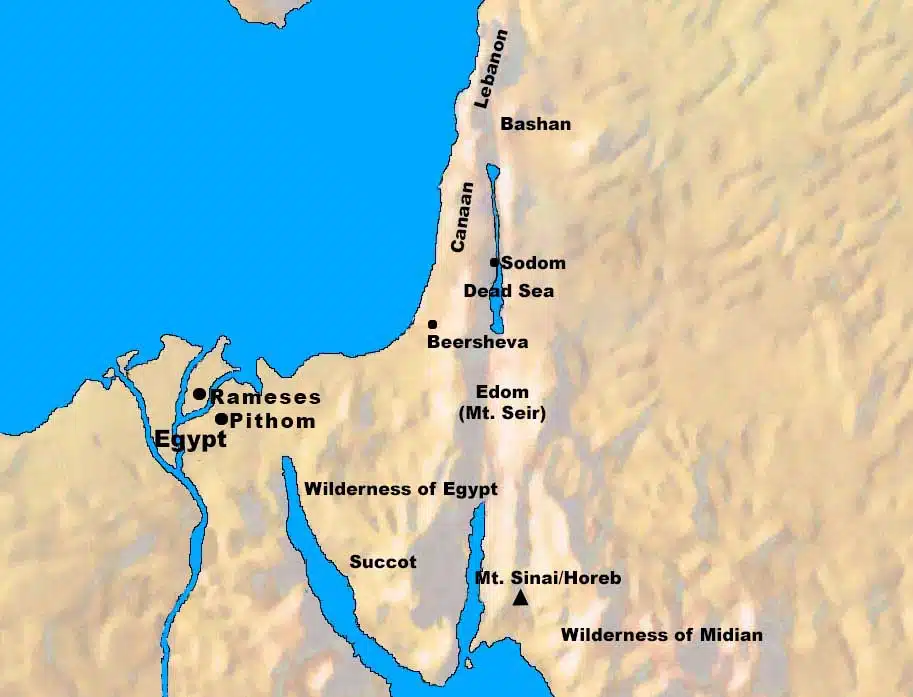The LORD describes the sin offering required to atone for the sins of Aaron and his sons. Sinful and fallen people must be cleansed before they can minister in the presence of the holy God.
After Aaron and his sons have been washed and clothed with the priestly garments, the next part of the ordination ceremony took place. It involved presenting several sacrifices. The first of these sacrifices was to bring a bull before the tent of meeting. Then Aaron and his sons were to lay their hands on the head of the bull. This symbolized the transferring of their sins to the sacrificial animal that was going to bear their sin. All these activities are symbolic of the sacrifice Jesus will make on the cross for the sins of the world.
Then, they were to slaughter the bull before the Lord at the doorway of the tent of meeting, symbolizing that the sacrifice was made in the LORD’s presence.
After the bull was slaughtered, the priests were to take some of the blood of the bull and put it on the horns of the altar with your finger. The horns of the altar were on its four corners (Exodus 27:2). This might have looked forward to Jesus’s sacrifice covering all the sins of humanity, from the four corners of the world.
They were then required to pour out all the blood at the base of the altar. Placing blood on the horns of the altar (the top of the altar) and at its base. This could have looked forward to Jesus’ side being pierced, and His blood pouring out. His blood was shed for us and provided redemption from our sins for all who believe (Matthew 26:28; John 19:34; Romans 3:25; Romans 5:9; Ephesians 1:7).
The priests were then to take all the fat that covers the entrails and the lobe of the liver. The fat was probably the fat just under the flesh and around the internal organs. The entrails primarily refers to the organs involved with eliminating bodily waste. They also needed to take the two kidneys and the fat that is on them. Since the two kidneys were also involved in eliminating bodily waste, they needed cleaning as well. The priests were to offer up these organs in smoke on the altar.
The last part of the offering involved the flesh of the bull and its hide and its refuse. These parts of the sacrificial animal they were to burn with fire outside the camp. Hebrews 13:11-13 tell us that Jesus suffered death “outside the gate” (of the city), and this was foreshadowed by the the burning of the hides of the sin offerings outside the camp (verse 14). Even this small detail looked forward to the ultimate sacrifice for sin that would be made by Jesus offering Himself willingly. Burning the flesh outside the camp symbolized that the sacrifice separated the people from their sins.
In summary, it is a sin offering. The word translated sin here is “hatta’t,” which means “missing the mark.” This offering was the means of removing the sins and their penalty from the people. It was also a precursor to what Jesus Christ did on our behalf to remove our sin and guilt.
The New Testament book of Hebrews makes a parallel with this burnt offering, or offering of ascension. Jesus was crucified outside the gates of Jerusalem. This NT passage makes application that His followers should live apart from the world (Heb. 13:11 – 13).
Biblical Text:
10 “Then you shall bring the bull before the tent of meeting, and Aaron and his sons shall lay their hands on the head of the bull. 11 You shall slaughter the bull before the Lord at the doorway of the tent of meeting. 12 You shall take some of the blood of the bull and put it on the horns of the altar with your finger; and you shall pour out all the blood at the base of the altar. 13 You shall take all the fat that covers the entrails and the lobe of the liver, and the two kidneys and the fat that is on them, and offer them up in smoke on the altar. 14 But the flesh of the bull and its hide and its refuse, you shall burn with fire outside the camp; it is a sin offering.
Check out our other commentaries:
-
Acts 4:13-22 meaning
The religious leaders are shocked that Peter and John speak so defiantly. They see that the apostles are uneducated but were followers of Jesus during...... -
Genesis 18:23-26 meaning
Abraham bargains with God to spare them from judgement. if He will destroy the righteous with the wicked sinners. ...... -
Genesis 19:4-7 meaning
The men of Sodom surrounded Lot’s house and demanded the two men be handed over to them to be sexually assaulted. Lot went outside to...... -
Deuteronomy 11:13-17 meaning
Moses commands Israel to love their Suzerain God and to serve Him faithfully in order that the land of Canaan may continue to receive rain...... -
Numbers 2:17 meaning
The next part of the procession was the tent of meeting (the tabernacle). The Levites, who camped around the tabernacle, were to move out with......



